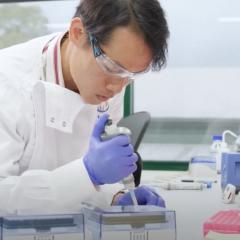Researchers at the UQ Centre for Clinical Research (UQCCR) have been awarded over $5 million in funding recently announced by The National Health and Medical Research Foundation.
UQCCR Director, Professor Murray Mitchell, said the funding received would allow researchers to advance efforts to prevent, manage or treat conditions like breast cancer, Ataxia-Telangiectasia, and post-stroke language impairment (aphasia), and improve health outcomes for babies born preterm or at risk of brain damage from seizures.
“This research has the potential to make a significant difference to the quality of life for many Australians.”
“By focussing on the prevention and treatment of these conditions we will enable more individuals to live a long and healthy life.”
The grants were part of the $52m awarded to UQ researchers from the NHMRC, which were announced on 17 October 2014 by the Prime Minister, the Hon Tony Abbott MP and the Minister for Health, the Hon Peter Dutton MP.
Six researchers received funding for research projects:
- Professor Paul Colditz receives $1,645,141 for his project titled 'Neurodevelopment of the preterm infant'. His research aims to predict neurodevelopmental disability in babies born very preterm (23-31 weeks gestation), earlier and more accurately than currently possible, so that subsequent targeted, effective interventions can be implemented.
- Professor Martin Lavin receives $920,798 for his project titled ‘To investigate the role of ATM in protecting against neurodegeneration’.
His research will investigate the mechanisms of neurodegeneration in Ataxia-Telangiectasia (A-T) – a rare genetic disorder. Using a unique model, researchers will examine the processes leading to neurodegeneration in A-T. They hope to develop a far more comprehensive understanding of how and why a deficiency in ATM - a protein that plays a central role in a variety of cellular processes such as DNA damage recognition repair - alters brain function. This will hopefully highlight novel pathways to therapy.
- A/Professor Marcus Meinzer receives $502,131 for his project titled ‘Neural mechanisms of language facilitation in aphasia due to transcranial direct current stimulation’. A/Professor Meinzers work will explore the use of transcranial direct current stimulation (tDCS), a novel non-invasive brain stimulation technique, in enhancing treatment outcomes of people recovering from post-stroke language impairment (aphasia).
- A/Professor Kiarash Khosrotehrani receives $922,589 for his project titled ‘Role of resident endothelial progenitor cells in melanoma vascularisation and progression’. (A/Prof Khosrotehrani holds a joint appointment with the UQ Diamantina Institute).
In a recently funded NHMRC project conducted at UQCCR, A/Professor Khosrotehrani’s team identified the progenitors that in response to injury formed the neovessels required for wound healing but also tumours. This new projects extends these findings in the context of melanoma. It will consider the role of progenitor dependent vasculogenesis for arteries, veins and lymphatics that are produced in melanoma tumours to identify new targets for therapy.
- Dr Peter Simpson receives $1,114,997 for his project titled ‘Defining the genomic and therapeutic landscape of familial breast cancer’.
His study aims to improve breast cancer diagnosis and patient management in patients with an inherited predisposition to breast cancer. In order to gain important insights into tumour biology and identify treatment opportunities, Dr Simpson and his colleagues will analyse a unique cohort of familial breast cancer samples using whole-genome sequencing.
- Dr Tracey Bjorkman receives $850,890 for her project titled ‘Carbon dioxide as a treatment for seizures in the newborn’.
Her study aims to prevent brain damage from seizures in babies by using carbon dioxide as an antiepileptic treatment. Dr Bjorkman and her colleagues aim to introduce a simple and effective treatment to change standard clinical practice for the treatment of neonatal seizures. This will fundamentally impact the long-term neurodevelopmental outcomes for affected babies and significantly reduce the burden of brain injury on both families and society.
Contact: Kate Sullivan, UQCCR Marketing Communications Officer on 07 3346 6041 or email k.sullivan4@uq.edu.au



